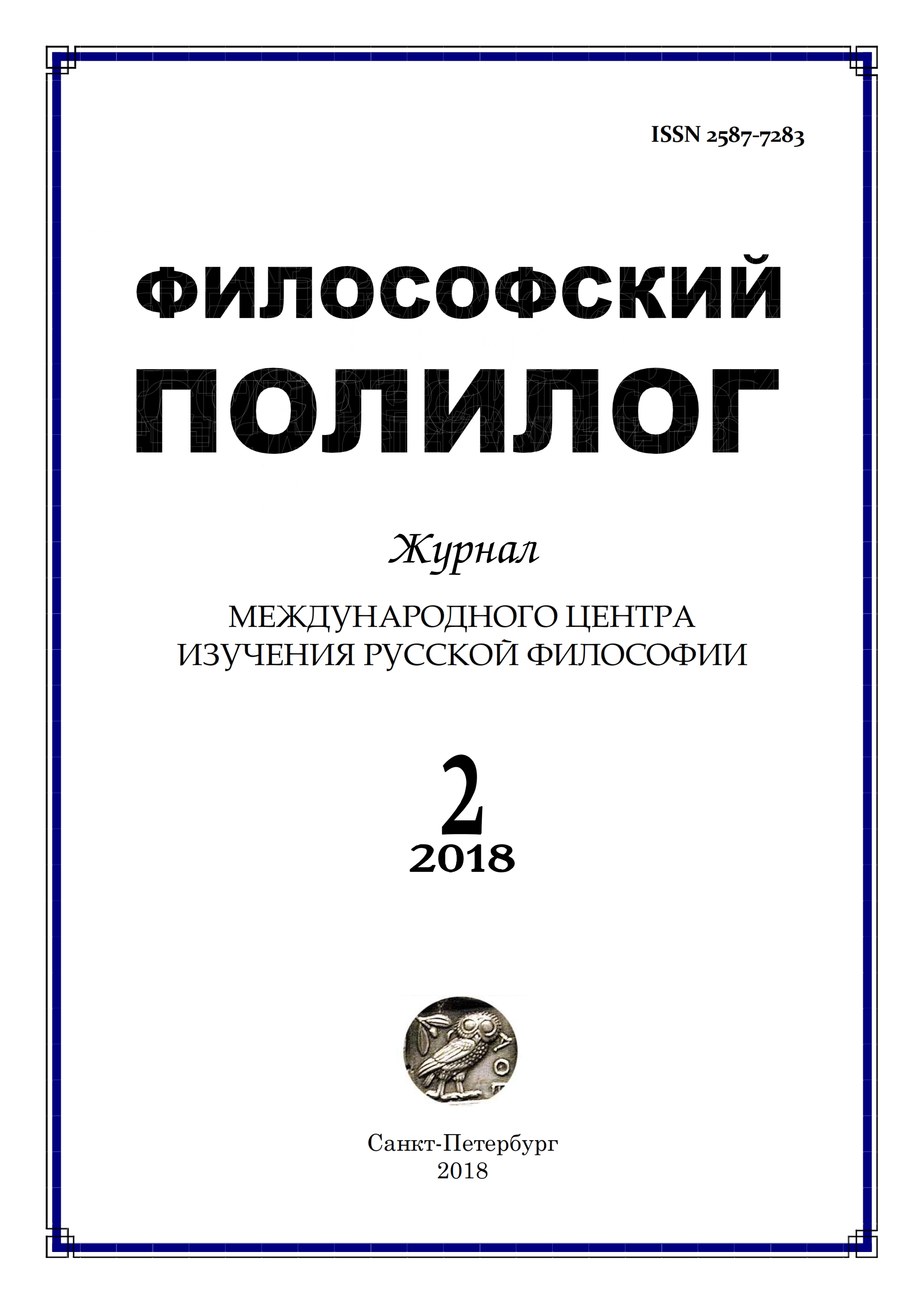To live and think within the limits of the possible. On M. N. Epstein’s “Projective Dictionary”
Abstract
The idea of a “projective dictionary” and the way it was realized in the philosophical work of M. N. Epstein are analyzed. Special attention is paid to the proposed rationale for the possibility of creativity, the relevant concepts introduced by M. N. Epstein are critically examined. It is claimed that the main purpose of writing the “Projective Dictionary” was to make it obvious and to solve the problem of freedom. The basic concepts of freedom created in the history of Russian thought are described, the tendency of interpreting freedom through necessity prevailing both in the religious-metaphysical and Soviet-Marxist philosophical traditions is analyzed. It is stressed that such interpretation resulted in the removal of freedom from the real life, on the one hand, and in the fact that freedom was never regarded as a problem by most of Russian philosophers, on the other. Instead of it freedom was replaced with the concept of freedom, or a rational-metaphysical construct, and it is this concept that was developed in Russian philosophical culture, or more exactly, in its main trends. No wonder that such a freedom was used to legitimize the corresponding views and prevent dissent. Criticism of metaphysics, which began in Russia in the mid-nineteenth century, led to a “natural” interpretation of freedom. However, this understanding was not generally acknowledged. It is concluded that the philosophical value of the “Projective Dictionary” is determined by the attempt to actualize and develop the “natural”, non-metaphysical concept of freedom.
References
Berdyaev, N.A. Mirosozertsaniye Dostoyevskogo [Dostoevsky’s outlook], in Ber¬dya¬ev, N.A. Russkaya ideya. Mirosozertsaniye Dostoyevskogo [Russian idea. Dos¬to¬ev¬sky’s outlook], Moscow: Publishing House “E”, 2016.
Berdyaev, N.A. Smysl tvorchestva [The meaning of creativity], in Berdyaev, N.А. Filosofiya svobody. Smysl tvorchestva [Philosophy of freedom. The meaning of creativity], Moscow: Pravda, 1989.
Berdyaev, N.A. Filosofiya svobody [Philosophy of Freedom], in Berdyaev, N.A. Filosofiya svobody. Smysl tvorchestva [Philosophy of freedom. The meaning of creativity], Moscow: Pravda, 1989.
Bogdanov, A.A. Novyy mir [New world], in Bogdanov, A.A. Voprosy sotsializma: Raboty raznykh let [Questions of socialism: Works of different years], Moscow: Politizdat, 1990.
Herzen, A.I. S togo berega [From the other bank], in Herzen, A.I. Sochineniya [Writings], in 2 vol., vol. 2, Moscow: Mysl’, 1986.
Dostoevsky, F.M. Zapiski iz podpol'ya [Notes from the underground], in Do¬s¬to¬ev¬sky, F.M. Polnoye sobraniye sochineniy [Complete works], in 30 vol., vol. 5, Lenin¬grad: Nauka, 1973.
Dostoevsky, F.M. Podrostok: Rukopisnyye redaktsii [Teenager: Handwritten edi¬tions], in Dostoevsky, F.M. Polnoye sobraniye sochineniy [Complete works], in 30 vol., vol. 16, Leningrad: Nauka, 1976.
Ilyenkov, E.V. Fikhte i “svoboda voli” [Fichte and “free will”], in Ilyenkov, E.V. Filosofiya i kul'tura [Philosophy and culture], Moscow: Litizdat, 1991.
Ilyin, I.A. Put' dukhovnogo obnovleniya [The path of spiritual renewal], Moscow: Institute of Russian Civilization, 2011.
Kantor, V.K. Lyubov' k dvoyniku. Mif i real'nost' russkoy kul'tury: Ocherki [Love to the lookalike. Myth and reality of Russian culture: Essays], Moscow: Scientifical-political book, 2013.
Karsavin, L.P. O dobre i zle [About good and evil], in Karsavin, L.P. Malyye sochineniya [Small writings], St. Petersburg: Aletheia, 1994.
Comte-Sponville, A. Filosofskiy slovar' [Philosophical dictionary], Moscow: Eterna, 2012.
Lotman, Yu.M. Kul'tura i vzryv [Culture and explosion], Moscow: Gnosis, 1992.
Rybas, A.E. “Dialektika” podpol'nogo cheloveka: Dostoyevskiy vs. Nitsshe (“Dialectics” of the underground man: Dostoevsky vs. Nietzsche), in Veche. Al'manakh russkoy filosofii i kul'tury [Veche. Almanac of Russian philosophy and culture], No. 16, St. Petersburg: Publishing House of St. Petersburg State University, 2004.
Solovyov, V.S. Chteniya o Bogochelovechestve [Lectures on Divine Humanity], in Solovyov, V.S. Chteniya o bogochelovechestve; Stat'i; Stikhotvoreniya i poema; Iz “Trekh razgovorov...”: Kratkaya povest' ob Antikhriste [Lectures on Divine Humanity; Articles; Poems and a poem; From “Three Conversations ...”: A short story about the Antichrist], St. Petersburg: Khudozhestvennaya literatura, 1994.
Filosofskiy entsiklopedicheskiy slovar' [Philosophical encyclopedic dictionary], Moscow: Soviet Encyclopedia, 1983.
Epstein, M.N. Proyektivnyy slovar' gumanitarnykh nauk [Projective dictionary of the humanities], Moscow: Novoye literaturnoye obozreniye, 2017.
Epstein, M.N. Russkaya kul'tura na rasput'ye. Sekulyarizatsiya, demonizm i perekhod ot dvoichnoy modeli k troichnoy [Russian culture at the crossroads. Secularization, demonism and the transition from the binary to the ternary model], in Zvezda [Star], 1999. No. 1.

